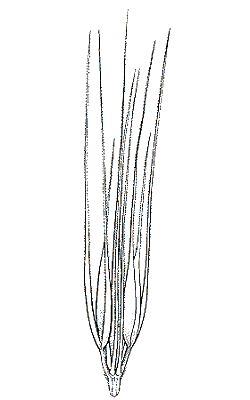 |
 |
|
 |
 |
|

Spikelets of many genera of the tribe Andropogoneae are borne in dissimilar pairs, one member of the pair being fertile (and often sessile) and the other pedicellate, sterile and smaller, these are termed companion sterile spikelets. This also includes isolated triads and barren pedicels. There are also companion sterile spikelets in a few other genera, but most genera do not have companion sterile spikelets.
spikelet: a unit of the
inflorescence, usually consisting of two glumes and one or more florets (each
with palea and lemma between which the flower is borne).
inflorescence: the group or arrangement in which
spikelets are borne on a grass.
pedicel: the stalk of a flower.


Each spikelet consists of a number of flowers or florets arranged alternately on either side of a central axis, the rhachilla, above two empty bracts, the glumes. 'Bract' is a general term for a much reduced leaf, particularly small leaves subtending flowers. A grass flower is enclosed by two bracts, the outer one on the side away from the axis termed the lemma and an inner bract named the palea. The bracts, together with the flower, make up the floret.
